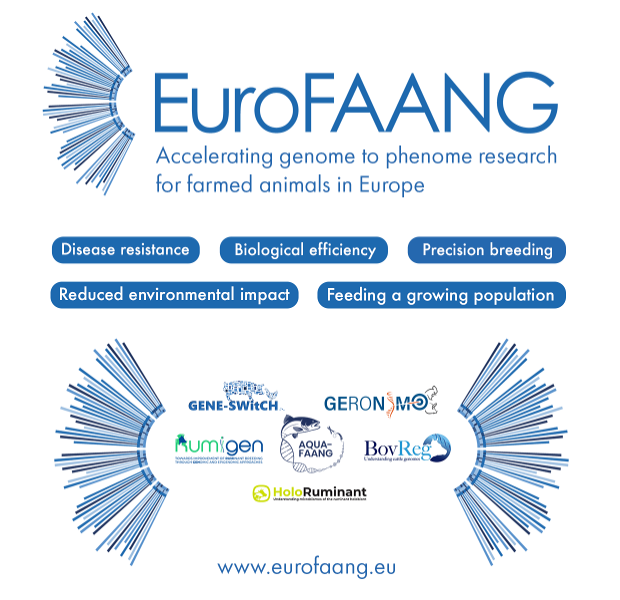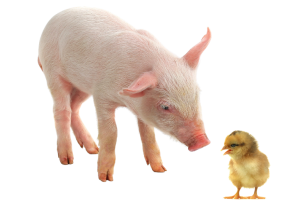EuroFAANG
By establishing EuroFAANG, the H2020 projects AQUA-FAANG, BovReg, GENE-SWitCH, RUMIGEN, GEroNIMO and HoloRuminant have formed a closer relationship to coordinate their objectives within Europe in association with the international FAANG initiative. EuroFAANG brings together a wide range of expertise in farmed animal biology and breeding, genomics, bioinformatics, modelling, and open data, as well as multiple platforms for dissemination and outreach, with a common goal to discover links between genome and phenome (i.e. G2P) in the frame of the FAANG to Fork strategy.
In EuroFAANG, the six projects have identified joint strategies to empower research a nd communication, dissemination, and training activities. Examples are the joint planning and development of collaborative analyses and the collaborative organisation of training courses. EuroFAANG further aims to maximise user engagement and uptake of the results by targeting a wide range of stakeholder groups.
nd communication, dissemination, and training activities. Examples are the joint planning and development of collaborative analyses and the collaborative organisation of training courses. EuroFAANG further aims to maximise user engagement and uptake of the results by targeting a wide range of stakeholder groups.
The combined efforts of H2020 projects within EuroFAANG aim to benefit from their shared objective of characterising the regulatory mechanisms and functional components of the genome of farm animals to unravel the underlying mechanisms of complex breeding traits that are important for a more efficient and sustainable animal production.
The EuroFAANG projects study a wide range of farm animal species, including farmed fish, cattle, pigs, and chickens. Although the genomes for most domesticated animals have been successfully sequenced, we have a limited understanding of regulatory mechanisms and functional regions in the DNA that modulate gene transcription under different conditions. The work of the EuroFAANG projects will allow improving the functional annotation of genomes, including chromatin accessibility and modifications. In addition, it will also allow to understand the extent of environmentally induced regulation of the genome through epigenetic mechanisms that lead to changes in gene expression, and to estimate the transmission of epigenetic information to future generations. A significant output of the projects participating in the EuroFAANG initiative will be to provide improved prediction models to be used in breeding. To accelerate scientific and industrial research, data generated by the projects is made rapidly publicly available via the EMBL-European Bioinformatics Institutes public archives, Ensembl genome browser and the EuroFAANG data portal.
Being able to use genomic information to predict phenotypes in specific environments helps us to address the current challenge of feeding a growing world population with sustainable and healthy food in a profitable and socially responsible way. Within the combined efforts of EuroFAANG, the knowledge developed will be used to improve:

The main production traits for ruminants known for their complex (epi)genetic and microbiome interactions: disease susceptibility (e.g. mastitis), robustness, efficiency (also in relation to GHG emissions) and heat- and stress tolerance.

Several complex traits (e.g. growth rate, feed efficiency, fertility, product quality) related to sustainable and efficient production in monogastrics (pigs and poultry), and assess whether the epigenetic effects induced by a major environmental factor (i.e. diet) on the embryonic genome persist in the offspring.

Precision breeding in aquaculture by enhancing traits of commercial relevance within the most important fish species used in European aquaculture (Atlantic salmon, rainbow trout, common carp, European seabass, gilthead seabream and turbot), with a special focus on disease resistance.
EuroFAANG aims to produce standardised protocols for functional annotation and ensure that the outputs are gathered in datasets that are comparable and reusable. Additionally, these efforts will encourage and pave the way for research on functional annotation in other animal species that have not yet been addressed. By combining contributions from global members and projects EuroFAANG will promote high-quality functional annotation of animal genomes, paving the way for robust genomic studies to improve sustainable and profitable animal production in Europe through exploitation in breeding programmes and management tools. For the latest updates, please see https://eurofaang.eu/.
To accelerate scientific and industrial research, data generated by the projects is made rapidly publicly available via EMBL-EBI’s public archives: the Ensembl genome browser and the EuroFAANG data portal.







